Greece has to 'show it's serious'published at 20:07 BST 11 July 2015
The BBC's Europe correspondent tweets...
Eurozone ministers speak of 'difficult issue of trust' over Greek promises to implement reform
They are assessing Greek proposals similar to those rejected in last Sunday's referendum
Athens aiming to secure a new bailout and avoid exiting the euro
One option reportedly suggested by Germany would see Greece temporarily leave the eurozone
Dominic Howell, Lauren Turner, Claire Brennan and Thom Poole
The BBC's Europe correspondent tweets...
 The Daily Telegraph
The Daily Telegraph
Less than a week after they triumphantly gave international creditors a bloody nose by rejecting a harsh austerity plan, angry and bewildered Greeks are left wondering how they now find themselves swallowing an even worse deal, writes The Daily Telegraph's Nick Squires.
So whatever happened to the referendum result, he asks?
Read more here, external.
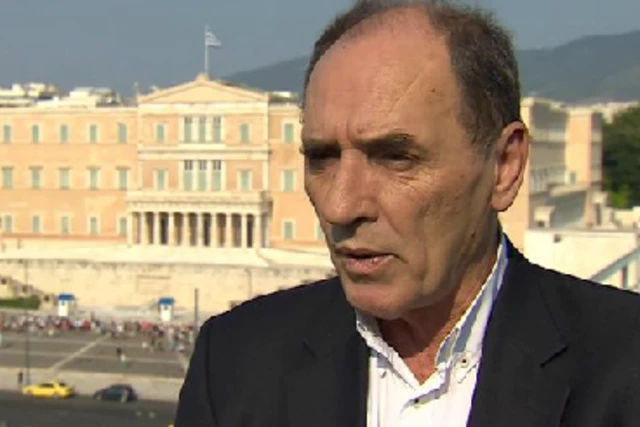
Watch the BBC interview with Greek Economy Minister Giorgos Stathakis here - he tells Gavin Hewitt that a deal will be reached this weekend, with trust rebuilt "step by step".
He also says Greece's latest proposals in negotiating with creditors have been accepted by eurozone finance ministers.
Europe editor of the Guardian tweets...
Channel 4 News economic editor tweets...
 Image source, Reuters
Image source, ReutersA chess board on display in an Athens shop - many Greeks feel it is particularly apt today, with what they see as tactical moves being made miles away in Brussels.
Perhaps unsurprisingly, the BBC's Jenny Hill, in Brussels, says the talks are said to be going "extremely slowly" - and that they are expected to continue long into the evening.
Sources have told our correspondent there is a "50/50 chance" of a deal being struck. However, Germany was said to be "putting up fierce resistance at the negotiating table".
Our correspondent Theo Leggett continues:
Quote Message[German] officials may well have been exploring numerous different options. These could simply have been leaked in order to put more pressure on Greece during the negotiations.
Quote MessageIt's hard to see the benefits of casting Greece into a limbo where it would apparently be neither a full member of the euro, nor committed to producing its own currency and rebuilding its economy outside the single currency zone.
Quote MessageHowever there seems little doubt that, even if this weekend's talks prove fruitful, future negotiations between Greece and its creditors are likely to be fraught.
Quote MessageYes, Athens has already agreed to most of their demands - despite the resounding 'No' vote in last Sunday's referendum. But the process has moved on. It's no longer about releasing a mere 7.5 billion euros from an existing funding programme. Greece is now requesting a new three-year bailout, worth 53.5 billion euros. For that kind of money, it is likely to face demands for yet more painful reforms.
Here's the latest from the BBC's Theo Leggett on those reports on Germany's position:
Quote MessageThe Frankfurter Allgemeine Zeitung says it has seen a German position paper which sets out two possible options for Greece - firstly, it could transfer assets worth 50bn euros into a special fund; they could then be sold and the revenue used to pay off its creditors.
Quote MessageSecondly, it could take a five-year 'time out' from being a member of the euro, in order to restructure its debts.
Quote MessageA note of caution: although this paper appears to come from within the finance ministry, it does not necessarily reflect Germany's actual position in the talks. Indeed, there are some indications that it doesn't.
Greek newspaper Tovima reports, external (in Greek) that there has been a pause in proceedings to allow Greek Prime Minister Alexis Tsipras, who is in Athens, and Finance Minister Euclid Tsakalotos, in Brussels, to discuss matters over the phone.
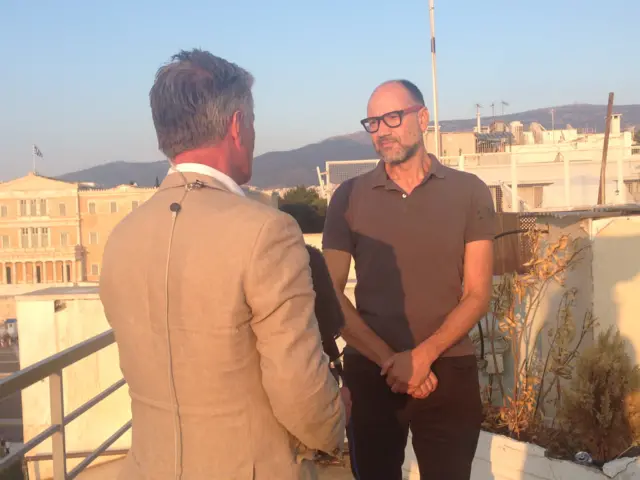
And here's a different view of things.
Stathis Kalyvas, professor of political science at Yale University, tells the BBC's Tim Willcox he is feeling very positive.
He says it is the first time there is the political will to change things and that he thinks Alexis Tsipras is the person who can lead that change.

'No' voter Vasilis Papadopoulos, 24, says he wants to leave Greece because he doesn't see a future in the country. Instead, he has applied to study in the UK.
"Nothing is changing here", he says.
Watch our interview with him here.
Brussels deputy bureau chief for AFP news agency tweets...
Wall Street Journal writer tweets...
Deputy editor of Greek daily Kathimerini English Edition tweets...
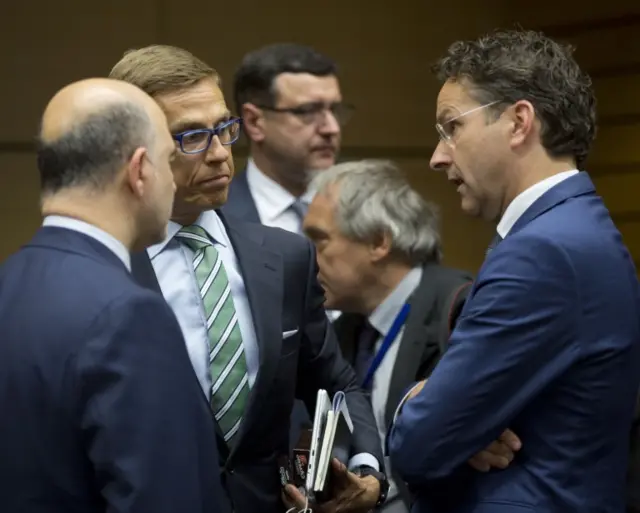 Image source, AP
Image source, APMore pictures have come in from inside the Lex building, where the meeting is taking place. Here (above) is Dutch Finance Minister Jeroen Dijsselbloem - who is chairman of the eurogroup - on the right, speaking with EU economy commissioner Pierre Moscovici, far left, and Finland's Finance Minister Alexander Stubb, centre.
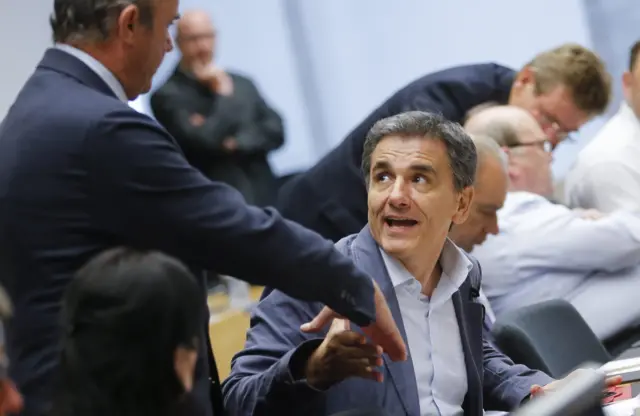 Image source, EPA
Image source, EPAHere's a friendly welcome being given to Greek Finance Minister Euclid Tsakalotos (right) by Spain's Economy Minister Luis de Guindos.
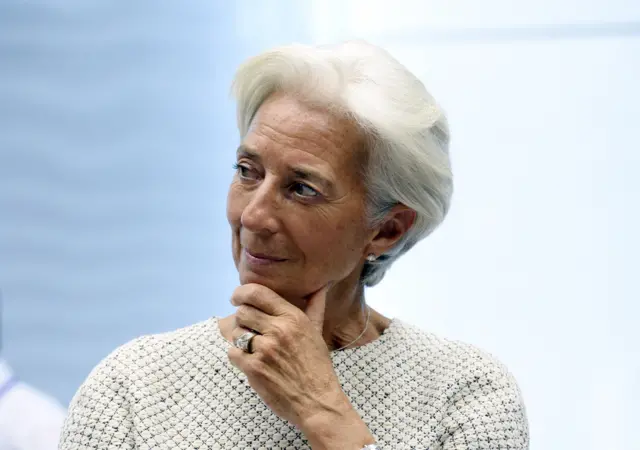 Image source, AFP/Getty
Image source, AFP/GettyPenny for your thoughts? IMF chief Christine Lagarde pictured before proceedings got under way.
The BBC economics editor tweets...
The deputy editor of Greece's Kathimerini newspaper tweets...
Allow Instagram content?
This article contains content provided by Instagram. We ask for your permission before anything is loaded, as they may be using cookies and other technologies. You may want to read Meta’s Instagram cookie policy, external and privacy policy, external before accepting. To view this content choose ‘accept and continue’.
Where there is a crisis, there is also an opportunity - as demonstrated by this Bitcoin ATM recently installed in Athens. While Greeks are limited in how many euros they can withdraw, there are no such limits in exchanges of the virtual currency. Fortune explains more, external .
 Image source, AP
Image source, APThe New York Times, externalhas a stark report on how the cuts have hit Greece's poor and hungry. One businessman told them:
Quote MessageIn the third round of austerity measures, which is beginning now, it is certain that in Greece there will be no consumers, there will be only beggars.